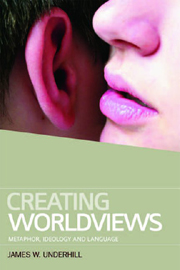Book contents
- Frontmatter
- Contents
- Acknowledgements
- Dedication
- Part I Metaphor
- 1 Metaphor and World-Conceiving
- 2 A Concern for Metaphor
- 3 Metaphors We Live By
- 4 Other Developments in Metaphor Theory
- 5 Further Cognitive Contributions to Metaphor Theory
- 6 Diversity on the Periphery
- Part II Case Studies in Metaphor
- Glossary
- Bibliography
- Index
1 - Metaphor and World-Conceiving
from Part I - Metaphor
Published online by Cambridge University Press: 12 September 2012
- Frontmatter
- Contents
- Acknowledgements
- Dedication
- Part I Metaphor
- 1 Metaphor and World-Conceiving
- 2 A Concern for Metaphor
- 3 Metaphors We Live By
- 4 Other Developments in Metaphor Theory
- 5 Further Cognitive Contributions to Metaphor Theory
- 6 Diversity on the Periphery
- Part II Case Studies in Metaphor
- Glossary
- Bibliography
- Index
Summary
WORLDVIEWS
Few scholars would argue with the idea that words and worldviews are intertwined and that language and thought are related. But when we speak of language, what do we mean? Are we thinking of the language system, or the particular style or type of language used? Most sociologists, political analysts and philosophers are concerned with the ideological content of concepts. Theodor Adorno (1991a, 1991b, 1989), Raymond Williams (1983), Michel Foucault (2004), George Lakoff (1996) and Andrew Goatly (2007) are but a few of those who remind us that words are not innocent and that political systems, reigning ideologies and competing world-conceptions seek to shape and delimit the content we attribute to words like ‘citizen’, ‘individual’, ‘state’ and ‘nation’. Even those concepts we cannot help feeling belong to the personal world, the private world of intimacy, which should (so we would like to believe) remain untouched and aloof from the political sphere – concepts like ‘love’, ‘the family’, ‘the body’ and ‘purity’ – are taken over and integrated into the worldview of a dominant conceptual paradigm.
Writers such as Adorno, Williams and Foucault are working within the framework of the social sciences, and therefore tend to consider the individual as the ‘product’ of social systems. Language, or what such writers often call ‘discourse’, is considered as a means of social pressure: depending upon the level of coercion, such writers will speak of socialisation, indoctrination, propaganda and manipulation.
- Type
- Chapter
- Information
- Creating WorldviewsMetaphor Ideology and Language, pp. 3 - 16Publisher: Edinburgh University PressPrint publication year: 2011

